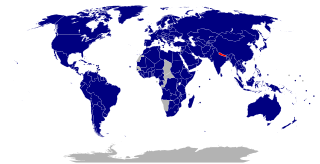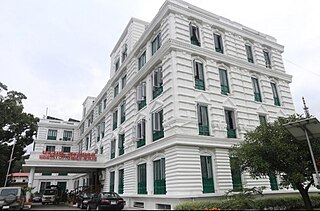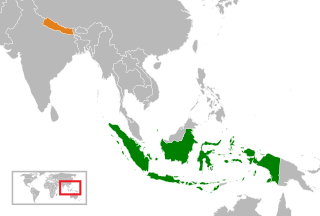
Though the Ministry of Foreign Affairs (MOFA) is the government agency responsible for the conduct of foreign relations of Nepal, historically, it is the Office of Prime Minister (PMO) that has exercised the authority to formulate and conduct policies related to Nepal's foreign affairs. As a landlocked country wedged between two larger and far stronger powers, Nepal has tried to maintain good relations with both of its neighbors, People's Republic of China and Republic of India. Nepal's relationship with China, and India has remained utmost priority for successive Nepali governments. The relationship between Nepal and India however was significantly hampered during the 2015 Nepal blockade by pro-Indian anti-Nepal protestors, where the Government of Nepal accused India of using "Russia-Ukraine" tactics to cause unrest along Nepal's southern border using ethnically Indian residents of Nepal. India strictly denied the allegation and said the unrest were solely due to Madheshi protesters. For the most part though, Nepal has traditionally maintained a non-aligned policy and enjoys friendly relations with its neighboring countries and almost all the major countries of the world.

The Communist Party of Nepal , abbreviated CPN (UML), is the largest left-wing party in Nepal since its formation in January 1991, merging the Communist Party of Nepal (Marxist) and the Communist Party of Nepal (Marxist–Leninist).

Sushil Prasad Koirala was a Nepalese politician and the Prime Minister of Nepal from 11 February 2014 to 10 October 2015. He was also President of the Nepali Congress from 2010 to 2016, having earlier served under various capacities in the party.
Nepalese literature is the literature of Nepal. This is distinct from Nepali literature, which is the literature in only Nepali language. The major literary languages of Nepal are:

The Rastrapati Bhawan is the official residence of the President of Nepal, located in Kathmandu, Nepal. It hosts the Office of The President of Nepal. The main palace building was and still is known as Sital Niwas. It was built by Rana Prime Minister Chandra Shumsher JBR in 1923.

Nepalis are the citizens of Nepal under the provisions of Nepali nationality law. The country is home to people of many different national origins who are the descendants of immigrants from India, Kashmir, Central Asia, and Tibet. The term Nepalis (Nepalese) is the nationality referred only to the people with citizenship of Nepal while the people without Citizenship but has roots in Nepal are strictly referred to as Nepali Speaking Foreigners who are speakers of one of the 128 Nepalese languages but are now foreign citizens or of foreign nationality bearing passports and citizenship of the foreign nation. It also strictly does not belong to non-citizen residents, dual citizens, and expatriates.

Israel–Nepal relations, established on 1 June 1960, are the relations between Israel and Nepal making Nepal one of the first Asian countries to have diplomatic ties with Israel.

Bahun or Khas Brahmin is a caste (Varna) among Khas people of Nepal. Their origins are from Indo-Aryans Khasa tribe of Nepal and South Asia. According to the 2011 Nepal census, Bahun is the second most populous group after Chhetri, another Varna within the hill Hindus in Nepal.

Kamal Thapa is a Nepalese politician belonging to Rastriya Prajatantra Party Nepal.
Bimal Prasad was an Indian historian known for his scholarship on modern Indian history. He was Indian ambassador to Nepal during 1991-1995.

The Ministry of Foreign Affairs(MoFA; Nepali: परराष्ट्र मन्त्रालय) is responsible for conducting external affairs of the Federal Democratic Republic of Nepal. Ministry of Foreign Affairs represents other line ministries and the Government of Nepal while dealing with other states.

The Nepal Praja Parishad was the first attempt to form an organization to lead the revolution against the Rana dynasty in Nepal. Led by Tanka Prasad Acharya, the group was founded in 1936, and is seen as the first political party in Nepal. The organisation collapsed after their plot to assassinate multiple members of the Rana regime was discovered, and some of its key members were executed.

Indonesia and Nepal established diplomatic relations in 1960. Neither country has a resident ambassador. Indonesia only establishes honorary consulate in Kathmandu, while its embassy in Dhaka, Bangladesh, is also accredited to Nepal. Nepal, on the other hand, accredited its embassy in Bangkok, Thailand, also to Indonesia. Both nations are also partners and founding members of the Non-Aligned Movement (NAM).

Ministry of Finance is the central authority of Government of Nepal charged with the responsibilities for maintaining both micro and macro economic stability in the country. The position of finance minister in Nepal is currently held by Janardan Sharma, appointed on 13 July 2021.
Khanal is a common surname among the hill brahmins and some hill chettris of Nepal and some northern Indian states. The Khanals belonged to the Thar Ghar aristocracy group which assisted the rulers of Gorkha Kingdom.

Ghumne Mechmathi Andho Manche is a Nepali language collection of poems by Bhupi Serchan. It won the Sajha Puraskar for the year 2025 BS. It was published by Sajha Prakashan. It is considered the poet's magnum opus, and argued to be on par with Muna Madan by Laxmi Prasad Devkota and Madhav Prasad Ghimire's Gauri. Prominent critic Taranath Sharma, litterateur Basu Rimal Yatri, Yadu Nath Khanal, and Hiramani Sharma Paudyal, were among the critics who published positive reviews on the work.
Professor Jaya Raj Acharya was ambassador of Nepal to the United Nations from 1991 to 1994, and is a well-known scholar of Nepal. He lectures at Tribhuvan University, has written many books, and is a prominent foreign policy expert especially in Nepal's relations with India and China. He's raised awareness of Nepal's education, state of Nepali politics etc. in international forums. He's done numerous TV appearances in the Nepali Media.
Shri Sahebju Purendra Bikram ShahSubikhyat-Tri-Shakti-Patta, Suprasidha-Prabala-Gorkha-Dakshina-Bahu, GCMG was a senior member of the Nepalese Royal clan. He was member of the Royal Advisory Council formed by King Mahendra of Nepal in 1955 as an independent member nominated by the King, a close relative. He also held other key portfolios as Minister including Defence (1956-1958) and Foreign (1958-1959) of Nepal.

Nepal–Turkey relations are the foreign relations between Nepal and Turkey. Bilateral diplomatic relations were established in 1962. The Turkish ambassador to India in New Delhi is accredited to Nepal and the Embassy of Nepal in Islamabad is accredited to Turkey.













